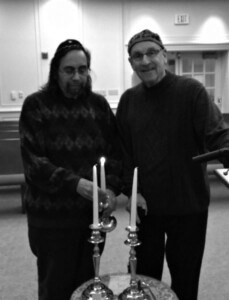This summer, in the wake of the U.S. Supreme Court’s Defense of Marriage Act decision, which legally recognized same sex married couples, Ohef Sholom noted a milestone in its 169-year-history: 12 years of inclusion for same sex families in its congregation.
At its May 2001 annual meeting, the congregation voted to alter their Bylaws’ definition of a “membership household” to include non-married couples, including LGBT (Lesbian, Gay, Bisexual, and Transgendered) individuals and partnerships. The Bylaws revision process was led by the worship committee chair, the Honorable Louis A. Sherman, after a lengthy group discussion and investigation of the temple’s current membership roster.
“We were simply responding to our current congregational make-up, particularly unmarried military couples,” remembers Judge Sherman. “It was just acknowledging the reality of the situation.”
The genesis for the entire process came from a recommendation from Rabbi Michael Joseph, who in October, 2000 noted the need to broaden the definition of “family” to encompass the wider variety of families he was welcoming into the congregation. His suggestion for a new unit of measurement, “a household consisting of at least one Jewish adult, plus unmarried children under the age of 30 living in the same domicile,” was adopted into the Temple’s Bylaws the following spring.
The vote was not unanimous. Some loudly opposed this “unprecedented vote” and vociferously stated their opposition until board member Andy Kline reminded the assembly that the words “My House Shall be Called a House of Prayer for All Peoples” (a quote from Isaiah) was carved in stone outside the Sanctuary. That ended discussion, and the vote was held.
“The day following the vote only one person resigned, who later rejoined,” recalls Gail Bachman, now temple administrator. Steady word of mouth eventually led to more same sex couples attending services. To date, Ohef Sholom and the former Temple Sinai of Portsmouth remain the only Tidewater synagogue where same sex couples have lit the Shabbat candles on the bima, and OST is the sole Jewish organization listed in the local Lambda Directory of LBGT support organizations.
Ohef Sholom Temple’s website states that “Reform Jews are committed to the full participation of LBGT congregants in all aspects of synagogue life as well as society at large.” The Union for Reform Judaism cites LBGT outreach as the fourth largest area of new members since 2009 (behind converts, interfaith families, and new families with children).
Twelve years later, Rabbi Roz Mandelberg says that there is a growing number of LGBT congregants, but declines to state the number. “No one likes to be marginalized,” she cautions, “besides which we are fully committed to living the Jewish value of Hachnassat Orchim or ‘Welcoming the Stranger’ without judgment. Indeed, the commandment to ‘respect the stranger in our midst because we, too, were once strangers in the land of Egypt’ is the most often repeated mitzvah in all of the Torah.”
At more than 750 family member units, Ohef Sholom continues to embrace new concepts and new definitions of the 21st century while still honoring its past. 2018 will mark the 100th anniversary of the Synagogue’s building at 530 Raleigh Avenue, followed by the 175th anniversary of the founding of the congregation in 2019.
Reminds Rabbi Mandelberg, the first female senior rabbi of a Tidewater congregation, “Times change and we must change with them. In the words of Mahatma Gandhi, ‘you must be the change you wish to see in the world,’ and we take pride in knowing we are.”
by Ted Kaufmaun


